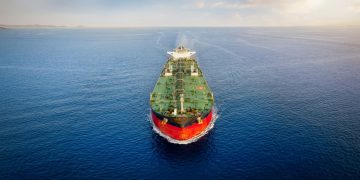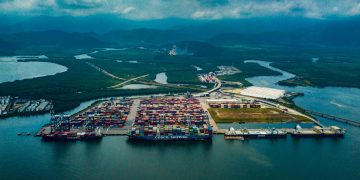Forty-nine international shipping companies opted in to protect endangered whales and reduce air pollution in coastal communities.
According to Protecting Blue Whales and Blue Skies (BWBS), the average container ship measures approximately four football fields, carrying about 15,000 standard 20-foot containers. These vessels carry goods and materials across the world’s oceans, often overlapping with important habitat for marine life. For marine species like whales, which have not evolved to avoid these massive ships, this can result in deadly collisions known as ship strikes.
Protecting Blue Whales and Blue Skies (BWBS) is a partnership between federal and local government agencies, foundations, and environmental nonprofits, including the California Marine Sanctuary Foundation; Channel Islands, Monterey Bay, Greater Farallones and Cordell Bank National Marine Sanctuaries; Benioff Ocean Science Laboratory; the Bay Area Air Quality Management District; Santa Barbara County, Ventura County and San Luis Obispo County Air Pollution Control Districts, and Monterey Bay Air Resources District.
BWBS monitors the speeds of vessels 300 GT (gross tons) and larger that pass through voluntary Vessel Speed Reduction (“VSR”) zones each year.
The Vessel Speed Reduction (VSR) Season is designed to coincide with endangered whale migration as well as peak ozone seasons for California coastal communities. In the 2024 Season, BWBS verified that 743 vessels, across 49 of the world’s largest shipping lines, opted-in to reduce their speeds. BWBS’ 2024 Season was the most significant yet, marking a jump in total participating shipping lines from 33 to 49 and an increase in distance traveled at “whale-safer” speeds.

Ship strikes are a major contributor of mortality to whales around the globe and are especially of concern in whale hotspots that overlap with major international shipping routes. However, if large vessels reduce their speeds to 10 knots or less in these areas when the likelihood of whale presence is highest, the risk of fatal strikes is reduced by 50% or more. Furthermore, reduced speeds result in fewer emissions of air pollutants and greenhouse gases.
Overall fleet cooperation continues to rise
In 2024, cumulative program cooperation rates continued to trend upward in both the San Francisco and Southern California VSR zones. Program-wide, 85% of the total distance traveled by participating vessels, equating to 425,981 nautical miles, was traveled at the requested whale-safer speeds of 10 knots or less. Out of all of the traffic traveling within the VSR zones, 78% of all container ships and 97% of all auto/RORO ships elected to participate in the BWBS program.
Some of the shipping companies participating in the program include CMA CGM, Connaught Shipmanagement HK, COSCO Shipping, CSL Americas, Hong Kong Top Honor Shipping, ISM Ship Management Ltd, Maersk, Marathon Petroleum, MSC, NYK Ro-Ro, Ocean Network Express and others.
Traveling at 10 knots or less has been found to significantly reduce:
- the risk of fatal whale strikes;
- air pollution and regional greenhouse gas emissions, and
- underwater noise pollution.


































































